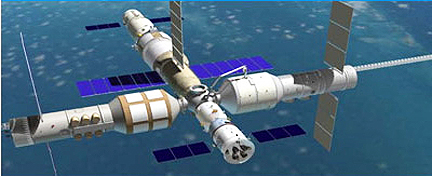
Artistic rendition of a proposed Chinese space station, courtesy of the Chinese Society of Astronautics
China had already announced plans to launch two unmanned modules next year, which are expected to undergo the nation's first space docking — an essential step towards building the space station. These steps are all part of the nation's ambitious space exploration program, which experts say it wants to put on a par with those of the United States and Russia. China sees the program as a symbol of its global stature, growing technical expertise, and the Communist Party's success in turning around the fortunes of the formerly poverty-stricken nation. The nation became only the third in the world to put a man in space independently — after the United States and Russia — when Yang Liwei piloted the one-man Shenzhou-5 space mission in 2003. And in September 2008, the Shenzhou-7, piloted by three astronauts, carried out China's first space walk.
China has also made strides in lunar exploration, aiming to become the second country to put a man on the moon. It launched its second lunar probe on October 1, hopes to bring a moon rock sample back to Earth in 2017, and has planned a manned mission to the moon for around 2020, according to state media.

